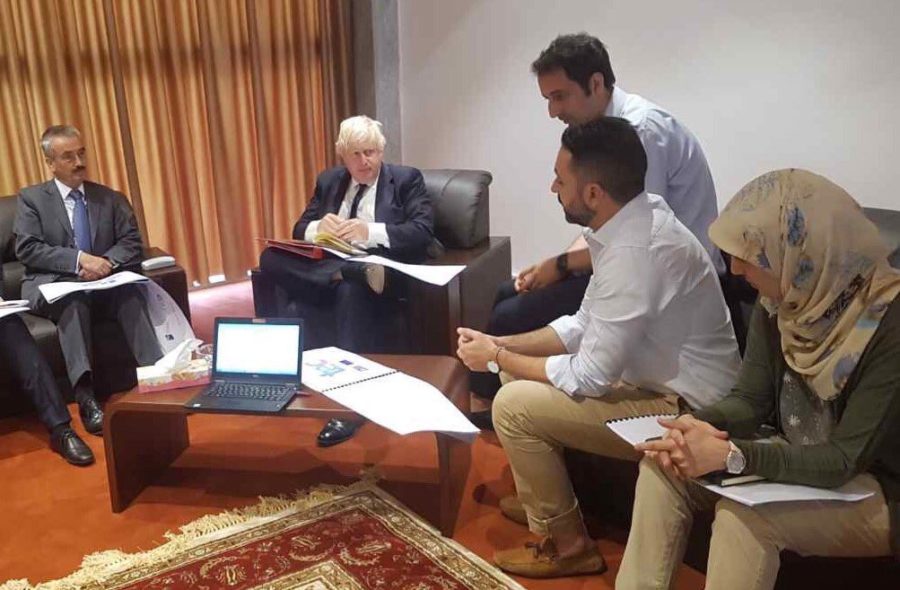11th September 2017 Tripoli, Libya
Behind the Scenes: Visiting Libya
Two weeks ago we arranged a visit to Libya by our Foreign Secretary, Boris Johnson. We went to Tripoli, Misrata and Benghazi. This followed a visit in May, when he visited Tripoli and Tobruq.
These visits involve careful planning and a lot of preparation. Working with colleagues in London and with the Libyan authorities, we worked to ensure that the visit was a success.
How do you measure “success”? One measure is that the visit runs smoothly and enables our Minister to meet the key players and understand what makes Libyans tick. Another measure is that we get our messages across to the public, both in Libya and in the UK.
Mr Johnson certainly met many of the Libyans who will influence and take decisions on the future of their country. He assured them of our strong support for the efforts of the United Nations’ envoy Ghassan Salamé to bring peace and stability to Libya. And he also announced £15m of humanitarian and development assistance to Libya.
Some of the meetings did not hit the headlines. But they were nonetheless important and worthwhile.
In Tripoli, he met representatives of women’s groups and discussed a UK-funded project to promote women’s rights. The Embassy has recently signed a contract with the Institute for War and Peace Reporting called “Ante Raeda” or “You are a Pioneer”.
The aim is to work with civil society groups who can make a difference. Women make up 50% of Libyans and should be seen as a major asset and talent pool for the country’s future.
This is not straightforward: navigating Libya’s culture, crises and conflicts is no easy task. Genuine Civil Society Organisations were non-existent during the Qadhafi era. They are starting from a low base. It is therefore essential for those who are trying to give women an opportunity to engage in dialogue with the authorities, the knowledge, best practice and confidence to enable them to do so effectively.
The Foreign Secretary discussed these issues with a group of women in Tripoli and encouraged them in their endeavours.
In Misrata, he focused on demining. He met representatives of Danish Demining Group who have been funded by the UK to undertake surveys of places where mines have been laid and remove some of the danger to citizens.
He also met contractors who will be training Libyans to tackle mines and improvised explosive devices. The aim is to enable the citizens of places like Sirte to return safely to their homes. The British government is providing £3m of demining equipment for this project. The representatives explained to Mr Johnson the complexity of the task and the dangers involved.
On to Benghazi, where we met Tatweer Research. This innovative company has a vision for the future of Libya. And they are doing something about it. They can see that Libya is far too dependent on two things: income from oil and gas, which makes about 90% of the government’s income. And the public sector where around 90% of the total work force is employed.

This economic model is unsustainable. The world is abandoning its love affair with the internal combustion engine and cars in future will be powered by electricity. That electricity will be generated by renewable sources.
So countries like Libya who are dependent on oil exports need to look at new sources of income: building a knowledge economy by tapping into homegrown talent and developing ambitious young minds to create jobs from innovation, entrepreneurship and science.
Tatweer is supporting the development of the Elmreisa Free Zone outside Benghazi will generate an estimated 60,000 direct jobs and a further 450,000 indirect jobs. This project draws heavily on expertise from British companies and institutions.
Was the visit a success? To coin a phrase from a British TV show: Yes, Minister!
with all due respect the UK one of the big five at the UNSC is not seen to be doing much towards addressing the real problem of the country security ,prominent libyans the like of Mr Dabashi are accusing the the UK of prolonging the status quo in the country some are accusing the UK of trying to divide the country after all divide and rule was for long British state policy.
Giving the benefit of the doubt we must see more British positive involvement, first by opening the embassy for business in Tripoli surely Britain can protect its mission easily ,the UK can do more to distract negative regional involvements in the country mainly from gulf states,the UK can give assurances that its with the unity of the country and give up its old policy to the contrary.
Thank you Mr ambassador